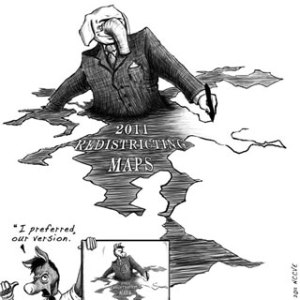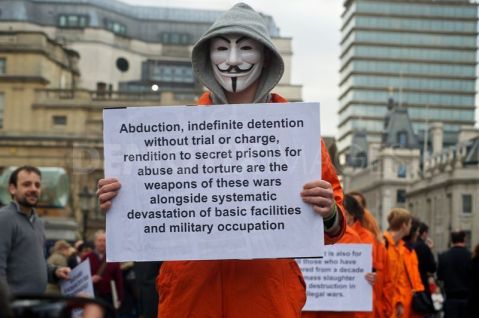Mass shootings and the U.S.’s international obligation to protect the right to life
Everyone has the right to life, liberty and security of person.
— Universal Declaration of Human Rights
The latest mass shooting in the United States – yesterday’s massacre at a community college in western Oregon – is another painful reminder of the U.S.’s inability or unwillingness to rein in its gun control problem and bring its laws into conformity with international norms.
The problem of U.S. gun violence has long caught the attention of the international community, including at recent review conferences examining U.S. compliance with various international conventions, with diplomats and experts repeatedly noting that U.S. laws may not fulfill international obligations of the United States government to protect life.
Following a review of the United States early last year by the UN Human Rights Committee for adherence to obligations under the International Covenant on Civil and Political Rights, the Committee’s concluding observations included the following passage on U.S. gun violence:
While acknowledging the measures taken to reduce gun violence, the Committee remains concerned about the continuing high numbers of gun-related deaths and injuries and the disparate impact of gun violence on minorities, women and children. While commending the investigation by the United States Commission on Civil Rights of the discriminatory effect of the “Stand Your Ground” laws, the Committee is concerned about the proliferation of such laws which are used to circumvent the limits of legitimate self-defence in violation of the State party’s duty to protect life (arts. 2, 6 and 26).
To bring the U.S. epidemic of gun violence under control and to fulfill its obligation to effectively protect the right to life, the UN recommended that the United States should:
(a) Continue its efforts to effectively curb gun violence, including through the continued pursuit of legislation requiring background checks for all private firearm transfers, in order to prevent possession of arms by persons recognized as prohibited individuals under federal law, and ensure strict enforcement of the Domestic Violence Offender Gun Ban of 1996 (the Lautenberg Amendment); and
(b) Review the Stand Your Ground laws to remove far-reaching immunity and ensure strict adherence to the principles of necessity and proportionality when using deadly force in self-defence.
At a review of U.S. compliance with the International Convention on the Elimination of All Forms of Racial Discrimination, held later in 2014, the United States was again admonished for its failure to comply with international obligations on protecting the right to life. The Committee on the Elimination of Racial Discrimination (CERD) observed that gun violence disproportionately impacts racial and ethnic minorities:
The Committee is concerned at the high number of gun-related deaths and injuries which disproportionately affect members of racial and ethnic minorities, particularly African Americans. It is also concerned at the proliferation of “Stand Your Ground” laws, which are used to circumvent the limits of legitimate self-defence, in violation of the State party’s duty to protect life, and have a disproportionate and discriminatory impact on members of racial and ethnic minorities (arts. 2, 5 (b) and 6).
As a recommendation, the Committee urged the U.S.
to take effective legislative and policy measures to fulfil its obligation to protect the right to life and to reduce gun violence, including by adopting legislation expanding background checks for all private firearm transfers and prohibiting the practice of carrying concealed handguns in public venues; increasing transparency concerning gun use in crime and illegal gun sales, including by repealing the Tiahrt Amendments; and reviewing the Stand Your Ground laws to remove far-reaching immunity and ensure strict adherence to the principles of necessity and proportionality when deadly force is used for self-defence.
The United States was again reminded of these recommendations during UN Human Rights Council’s Universal Periodic Review of the U.S. human rights situation in May 2015.
The CERD, the UN reminded the United States,
was concerned at the large number of gun-related deaths and injuries, which disproportionately affected members of racial and ethnic minorities, particularly African Americans. It urged the United States to reduce gun violence by, inter alia, adopting legislation expanding background checks for all private firearms transfers and reviewing the “stand your ground” laws.57 The HR Committee58 and the Special Rapporteur on violence against women, its causes and consequences59 made similar recommendations.
Despite all of these recommendations, needless to say, the U.S. has not taken any meaningful steps to bring its gun laws into compliance with its international obligation to protect the right to life. The result: so far this year, there have been 294 mass shootings in America, including yesterday’s in Oregon.
Verdict in: U.S. falling short on human rights
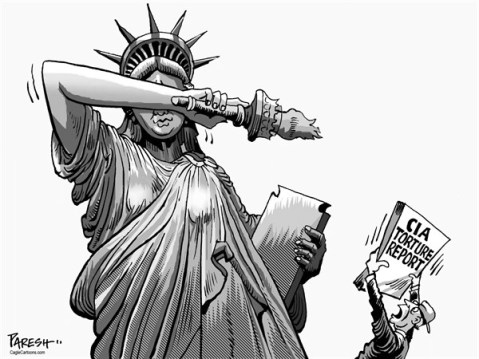 Far from being the global champion of human rights that it fancies itself as, the United States is in fact a flagrant violator of international human rights standards as enshrined in the Universal Declaration of Human Rights, the International Covenant on Civil and Political Rights and other landmark human rights treaties – some of which the U.S. refuses to ratify. This was the unmistakable conclusion of the U.S.’s Universal Periodic Review for compliance on human rights norms at the United Nations Human Rights Council earlier this week.
Far from being the global champion of human rights that it fancies itself as, the United States is in fact a flagrant violator of international human rights standards as enshrined in the Universal Declaration of Human Rights, the International Covenant on Civil and Political Rights and other landmark human rights treaties – some of which the U.S. refuses to ratify. This was the unmistakable conclusion of the U.S.’s Universal Periodic Review for compliance on human rights norms at the United Nations Human Rights Council earlier this week.
Delegates from many of the 117 countries taking part in the UPR lambasted the United States’ record of civil rights violations in the context of the nationwide epidemic of police brutality. The representative from Nambia, for example, said U.S. officials must “collaborate closely with marginalized communities to fix the broken justice system that continues to discriminate against them, despite recent waves of protest over racial profiling and police killings of unarmed black men.”
“Chad considers the United States of America to be a country of freedom, but recent events targeting black sectors of society have tarnished its image,” said Awada Angui, the delegate from that country.
The barrage of criticism led James Cadogan, senior counselor in the Department of Justice’s Civil Rights Division, to concede that the United States has a problem with police violence.
“We must rededicate ourselves to ensuring that our civil rights laws live up to their promise,” he said at the review on Monday. “The tragic deaths of Freddie Gray in Baltimore, Michael Brown in Missouri, Eric Garner in New York, Tamir Rice in Ohio, and Walter Scott in South Carolina have… challenged us to do better and to work harder for progress.”
But even while admitting its own shortcomings, the U.S. couldn’t resist the instinctual temptation to tout its record. As Mary McLeod, acting legal adviser to the U.S. Dept of State, put it, “We’re proud of the work we’ve done since our last UPR.”
Most UN Human Rights Council delegations and civil society observers strongly disagreed. One of the recurring themes in the interventions that took place on Monday was the U.S.’s failure to ratify a number of key human rights treaties and protocols, including the Convention on the Rights of the Child and Convention on the Rights of Persons with Disabilities, since its last periodic review in 2010. As Human Rights Watch noted,
In its 2010 review, the United States agreed to “consider” ratifying ICESCR, CEDAW, CRC, and CRPD (92.10, 92.11, 92.20, 92.21); ratifying ILO Convention Nos. 100 and 111 (92.22 and 92.26); ratifying the Rome Statute of the International Criminal Court (92.28); signing the Migrant Worker Treaty (92.30); lifting reservations to the ICCPR and other ratified human rights treaties (92.47, 92.48, 92.49); and establishing a national human rights institution (NHRI) at the federal level (92.74). To date, however, no new human rights treaty has been signed or ratified, no reservations, understandings or declarations have been lifted, and no NHRI established. The UPR is ineffective if limited to a conceptual exercise, and no country should claim success by accepting recommendations that require no identifiable outcomes or even proof of a deliberative process. The United States has failed to implement a number of other recommendations from its prior review. These include recommendations involving national security, criminal justice and policing, treatment of immigrants, and privacy, as detailed below, as well as overarching recommendations, such as agreeing to incorporate human rights training and education strategies in public policies (92.87). This submission also touches on issues that the United States did not address in its prior UPR but should consider in its upcoming review.
“The U.S. has little progress to show for the many commitments it made during its first Universal Periodic Review,” U.S. advocacy director at Human Rights Watch Antonio Ginatta told VOA News.
Brazil raised objections to the United States’ mass surveillance program, urging that all surveillance polices and measures comply with human rights law regardless of nationality, noting the importance of the principle of proportionality. The Brazilian delegation also criticized the U.S. record on migrant rights, and called for the elimination of police brutality.
The U.S. also heard criticism over the continued use of the death penalty.
The Belgian delegation said the U.S. should take specific measures to eliminate racial bias and wrongful convictions leading to executions. Swedish UN representative Anna Jakenberg Brinck called for a “national moratorium on the death penalty aiming at complete abolition.” Other countries, including France, pushed for “full transparency” in the types of drugs being administered to kill prisoners, following news that some death row inmates experienced inordinate pain and suffering during their executions.
The U.S.-led war on terror and the ongoing impunity related to the crimes of torture committed by the CIA were other areas of concern. One of the key demands of the UN delegations was for Washington to take measures to prevent acts of torture, to prosecute perpetrators, and to ensure that victims of torture were afforded redress and assistance.
Guantanamo was also raised, with some delegations including the United Kingdom recalling the pledge to close the prison by President Barack Obama back in January 2009 and regretting that it hasn’t happened yet. The UK called for an expedited effort to shut down the detention facility once and for all. More than 100 NGOs submitted reports on various aspects of U.S. human rights shortcomings, which are collected at the website UPR Info.
“Today was a demonstration of the no confidence vote that world opinion has made of the United States as a country that considers itself a human rights champion,” said Jamil Dakwar, director of the Human Rights Program of the American Civil Liberties Union. “I think that there was a clear message from today’s review that the United States needs to do much more to protect human rights and to bring its laws and policies in line with human rights standards.”
The UPR takes place every four years to scrutinize the human and civil rights practices of each of the UN’s 193 member nations.
DOJ report on Albuquerque police brutality a halting step towards accountability
Following a wide-ranging investigation of the Albuquerque Police Department (APD), the U.S. Justice Department said last Thursday that the APD has for years engaged in a pattern of excessive force that violates the Constitution and federal law.
The investigation, launched in November 2012, examined whether APD engages in an unconstitutional pattern or practice of excessive force, including deadly force, specifically identifying three general patterns of police abuse:
- APD officers too frequently use deadly force against people who pose a minimal threat and in situations where the conduct of the officers heightens the danger and contributes to the need to use force;
- APD officers use less lethal force, including tasers, on people who are passively resisting, non-threatening, observably unable to comply with orders or pose only a minimal threat to the officers; and
- Encounters between APD officers and persons with mental illness and in crisis too frequently result in a use of force or a higher level of force than necessary.
The DOJ’s findings come on the heels of the recent police murder of a homeless man that has sparked a wave of demonstrations in Albuquerque, New Mexico’s largest city.
APD officers gunned down 38-year-old James Boyd on March 16 in the Sandia foothills following a standoff and after he allegedly threatened officers with a small knife, authorities said. But a helmet-camera video showed Boyd agreeing to walk down the mountain with them, gathering his things and taking a step toward officers just before they fired.
“It’s a tremendous injustice,” said community leader Ralph Arellanes of the shooting. “This was something that caught the attention of the world.”
Indeed, the world has been taking notice, not just of this particular incident, but in general the ongoing epidemic of police violence and the criminalization of homeless people in the United States.
Just last month, the United Nations Human Rights Committee issued a scathing report documenting serious human rights abuses in the United States, including the nationwide problem of police brutality, in particular against people of color and the homeless.
In a section called “Criminalization of homelessness,” the Human Rights Committee expressed concern about reports of “criminalization of people living on the street for everyday activities such as eating, sleeping, sitting in particular areas etc.”
The Committee noted that such criminalization raises concerns of discrimination and cruel, inhuman, or degrading treatment under articles 2, 7, 9, 17,and 26 of the International Covenant on Civil and Political Rights, and urged the U.S. to “abolish criminalization of homelessness laws and policies at state and local levels.”
In another section on “Excessive use of force by law enforcement officials,” the Human Rights Committee found that across the country, there is an unacceptably “high number of fatal shootings by certain police forces, including, for instance, in Chicago, and reports of excessive use of force by certain law enforcement officers including the deadly use of tasers, which have a disparate impact on African Americans.”
In order to bring its practices in line with international norms on law enforcement, the UN recommended that the U.S. government should:
(a) step up its efforts to prevent the excessive use of force by law enforcement officers by ensuring compliance with the 1990 UN Basic Principles on the Use of Force and Firearms by Law Enforcement Officers; (b) ensure that the new CBP directive on use of deadly force is applied and enforced in practice; and (c) improve reporting of excessive use of force violations and ensure that reported cases of excessive use of force are effectively investigated, alleged perpetrators are prosecuted and, if convicted, punished with appropriate sanctions, that investigations are re-opened when new evidence becomes available, and that victims or their families are provided with adequate compensation.
The Basic Principles on the Use of Force and Firearms by Law Enforcement Officers that the Human Rights Committee referenced contains a number of guidelines that the U.S. would do well to implement in the interest of avoiding the unnecessary killings of civilians by police. For example,
Law enforcement officials, in carrying out their duty, shall, as far as possible, apply non-violent means before resorting to the use of force and firearms. They may use force and firearms only if other means remain ineffective or without any promise of achieving the intended result.
5. Whenever the lawful use of force and firearms is unavoidable, law enforcement officials shall:
(a) Exercise restraint in such use and act in proportion to the seriousness of the offence and the legitimate objective to be achieved;
(b) Minimize damage and injury, and respect and preserve human life;
(c) Ensure that assistance and medical aid are rendered to any injured or affected persons at the earliest possible moment;
(d) Ensure that relatives or close friends of the injured or affected person are notified at the earliest possible moment.
When tragedies do occur and police unnecessarily kill innocent people, the UN Basic Principles call for governments to “ensure that arbitrary or abusive use of force and firearms by law enforcement officials is punished as a criminal offence under their law.”
This is one area that is sorely lacking in the United States, with a general climate of impunity across the country for killer cops.
As a 2007 report prepared for the UN Human Rights Committee stated, the war on terror has “created a generalized climate of impunity for law enforcement officers, and contributed to the erosion of what few accountability mechanisms exist for civilian control over law enforcement agencies. As a result, police brutality and abuse persist unabated and undeterred across the country.”
“Systemic abuse of people of color by law enforcement officers has not only continued since 2001,” the report noted, “but has worsened in both practice and severity. According to a representative of the NAACP, ‘the degree to which police brutality occurs…is the worst I’ve seen in 50 years.’”
Even establishment publications such as the Wall Street Journal have noticed the troubling trend of rising police violence, dubbing the new breed of U.S. police officers “the warrior cop.” As a feature article in WSJ put it in August 2013,
Driven by martial rhetoric and the availability of military-style equipment—from bayonets and M-16 rifles to armored personnel carriers—American police forces have often adopted a mind-set previously reserved for the battlefield. The war on drugs and, more recently, post-9/11 antiterrorism efforts have created a new figure on the U.S. scene: the warrior cop—armed to the teeth, ready to deal harshly with targeted wrongdoers, and a growing threat to familiar American liberties.
In this context, while the new Justice Department report issued last week is certainly a welcome step towards some accountability, the fact is, much more is needed to bring U.S. police departments in line with international norms on law enforcement. A more comprehensive effort – including federal prosecutions of rogue cops – may be necessary if the United States is to bring itself into compliance with international policing norms.
Welcoming UN observations, civil society urges greater U.S. commitment to human rights
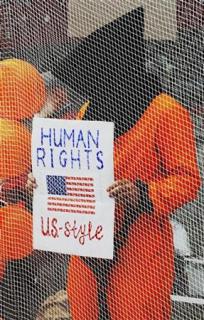 Following last week’s release of the UN Human Rights Committee’s “concluding observations” on the compliance of the United States with the International Covenant on Civil and Political Rights (ICCPR), U.S. civil society groups have urged greater commitment by the U.S. government in meeting its international obligations.
Following last week’s release of the UN Human Rights Committee’s “concluding observations” on the compliance of the United States with the International Covenant on Civil and Political Rights (ICCPR), U.S. civil society groups have urged greater commitment by the U.S. government in meeting its international obligations.
The American Civil Liberties Union (ACLU) said that the “scathing report” called into question the legitimacy of a wide range of current U.S. policies, including counterterrorism operations, immigrants’ rights, voting rights, and the criminal justice system.
“The committee’s recommendations highlight the gaps between U.S. human rights obligations and current laws and practices,” said ACLU Human Rights Program Director Jamil Dakwar.
“The Human Rights Committee rightly called out the United States for setting dangerous examples from counterterrorism operations to an unfair criminal justice system to inhumane treatment of migrants. President Obama now has an opportunity to reverse course and reshape his human rights legacy by taking concrete actions like declassifying the Senate report on CIA torture and ending dragnet surveillance and unlawful targeted killings,” Dakwar said.
Writing at the ACLU’s Blog of Rights, Astrid Reyes noted the extremely serious nature of the U.S.’s ICCPR violations:
The committee condemned the United States’ lack of accountability for disappearance, torture, and unlawful killings of terrorism suspects, and its failure to apply the ICCPR to international operations. In addition, the committee denounced racial disparities in law enforcement that have led to the incarceration of a disproportionate number of minorities (particularly Blacks and Latinos), effectively denying them basic human rights throughout the criminal justice process. This includes severe sentencing such as the death penalty and life without parole for juveniles; improper use of solitary confinement; and denial of civil rights following incarceration (most notably, the right to vote).
While the committee noted several areas where the U.S. record has improved since its last review in 2006, the Concluding Observations include important structural recommendations, such as creating an independent human rights monitoring body and expanding existing mechanisms to monitor the implementation of human rights at federal, state, local and tribal levels – providing them with adequate human and financial resources.
The U.S. Human Rights Network (USHRN), which has long been advocating for full implementation of the ICCPR at the federal, state and local levels, called the UN’s concluding observations “a strong reflection of the important work being done by human rights defenders across the country.”
“We welcome the UN Human Rights Committee’s recommendation that the U.S. ensure effective remedies for violations under the ICCPR and to take steps to bring U.S. domestic law in line with its human rights obligations,” said Ejim Dike, Executive Director of USHRN.
“We urge the Administration to follow up on the recommendations by the Committee which make clear that the US has significant work to do to fully comply with its human rights obligations in a broad range of issues including racial discrimination in the criminal justice system, gun violence, excessive use of force by law enforcement in communities of color and on the border, access to healthcare for immigrants, criminalization of the homeless, and forced psychiatric treatment,” she said.
The Center for Constitutional Rights (CCR) “applaud[ed] the UN and the international community for holding the US accountable to its international obligations and shedding a necessary light on areas where it is falling short,” describing the UN report as “highly critical.”
The UN’s main areas of concern, CCR noted, included:
- the U.S. “targeted killing” program;
- the lack of progress in the closure of Guantánamo, urging the U.S. to expedite the process of transferring detainees out of the prison, including to Yemen, and reiterating its position that the U.S. must end its practice of indefinite detention without charge or trial;
- the secrecy and lack of accountability around Bush-era abuses, including the limited number of investigations, prosecutions and convictions of contractors and high ranking U.S. officials for killings and torture of detainees;
- the imposition of the death penalty in a racially discriminatory manner and the conditions on death row;
- reports of criminalization of people living on the street for everyday activities such as eating, sleeping, and sitting in particular areas, raising concerns of discrimination and cruel, inhuman, or degrading treatment;
- the use of prolonged solitary confinement, particularly for at-risk people and those in pretrial detention, urging the abolition of solitary for people under 18 and for people with serious mental illness, and strict limitations on its use, overall; and
- the targeting of Muslims by the NYPD, and racial profiling overall (while underlining its support for recent plans to reform the use of stop and frisk).
Human Rights Watch (HRW) said “the United States should heed calls issued on March 27, 2014, by an important UN human rights body to ensure that its surveillance activities are consistent with the right to privacy, both within and outside its borders.”
HRW noted that the UN Human Rights Committee’s “conclusions address a wide range of serious human rights problems in the US, but the findings on surveillance are notable, as they are the committee’s first statement on the extent to which privacy rights are affected by widespread communications surveillance.”
The committee called on the United States to comply with privacy requirements set forth in article 17 of the ICCPR, particularly to respect the right to privacy, regardless of the nationality or location of individuals being monitored. It also criticized the lack of transparency in U.S. laws, urging the United States to reform its system of oversight of surveillance to protect the rights of those affected.
“The US insists it has no international legal obligations to respect the privacy rights of foreigners outside its borders, but one of the UN’s most important human rights bodies has now made clear it disagrees,” said Andrea Prasow, HRW’s senior U.S. national security counsel. “It’s time for the U.S. to recognize that people outside the country have just as much right to have their privacy respected as those inside the US, and that any surveillance must be strictly necessary and proportionate to achieve a legitimate aim.”
The Electronic Frontier Foundation (EFF) concurred, with EFF’s International Rights Director, Katitza Rodriguez, welcoming the Committee’s observations on U.S. violations of privacy rights. “It’s imperative the United States comply with its human rights treaty obligations, specifically Article 17 of the ICCPR, which protect the right of privacy for everyone in the same manner, within or outside US borders, regardless of nationality or place of residence,” Rodriguez said.
According to an EFF statement:
It’s very disappointing that the United States maintain its views that its human rights obligations under the ICCPR do not extend to its actions abroad, a view that defeats the object and purpose of the treaty. The Committee agreed and reiterates that the United States has an extraterritorial duty to protect human rights—including the right to privacy— to its action abroad regardless of the nationality or location of the individuals.
The Committee rightly criticized the current system of oversight for NSA surveillance activities, highlighting concern with the judicial interpretations of the Foreign Intelligence Surveillance Act (FISA) and secret rulings of the Foreign Intelligence Surveillance Court (FISC). These secret rulings prevent individuals from knowing the law with sufficient precision. Knowledge of and clarity in the law is a crucial principle that is clearly defined in our 13 Necessary and Proportionate Principles.
The NAACP, the nation’s oldest and largest civil rights organization, applauded the concluding observations, noting that the UN report identifies issues of felony disenfranchisement, stand your ground laws, the death penalty and more.
“This report reiterated what those in the civil rights community have known for too long – the United States has more work to do to meet its human rights obligations,” stated Lorraine C. Miller, NAACP Interim President and CEO.
“From felony disenfranchisement and stand your ground laws to voter suppression and the school to prison pipeline, we are pleased the Human Rights Committee has elevated these issues on the international stage. This gives us leverage in the United States to more aggressively address these issues at home,” she said.
While the reaction to the UN report was overwhelmingly positive, the U.S. human rights community was not entirely satisfied with the concluding observations. The Center for Constitutional Rights, for example, regretted that the Human Rights Committee failed to question the U.S. government on the devastation the invasion and occupation of Iraq has brought to both Iraqi civilians and U.S. veterans.
A “shadow report” submitted by CCR to the Human Rights Committee, entitled “US Veterans and Iraqi Organizations Seek Accountability for Human Rights Crisis Resulting from a Decade of US-Led War,” noted “the lack of any recognition whatsoever by the US government of the disastrous and tragic consequences” caused by the war against Iraq.
“Despite having waged an illegal war based on false justifications, no civilian or military official has been investigated or held accountable for their role in fabricating the justification to go to war in Iraq. In fact, the current administration recently argued in a legal case brought by victims of the Iraq war that officials responsible for planning and waging the war in violation of international law should be afforded immunity and shielded from suit,” CCR noted in its shadow report.
The full concluding observations of the UN Human Rights Committee are available here. For more information about U.S. obligations under the International Covenant on Civil and Political Rights, see the ACLU’s FAQ page.
Scathing criticism of U.S. human rights record at UN review
The United States came under sustained criticism last week during a two-day review by the United Nations Human Rights Committee for its compliance with the International Covenant on Civil and Political Rights (ICCPR), a legally binding treaty ratified by the United States in 1992.
Much of the attention that the review has received in the media has focused on the U.S.’s refusal to recognize the ICCPR’s mandate over its actions beyond its own borders, using the “extra-territoriality” claim to justify its actions in Guantánamo and in conflict zones.
Walter Kälin, a Swiss international human rights lawyer who sits on the committee, criticized the U.S. position. “This world is an unsafe place,” Kälin said. “Will it not become even more dangerous if any state would be willing to claim that international law does not prevent them from committing human rights violations abroad?”
Besides its controversial counter-terrorism tactics, including indefinite detention and the use of drones to kill terrorist suspects far from any battlefield, the U.S. also came under criticism for a litany of human rights abuses that included NSA surveillance, police brutality, the death penalty, rampant gun violence and endemic racial inequality.
The U.S. government was also reprimanded for the treatment of youth in the criminal justice system, with committee members pointing out that the sentence of life without parole for child offenders may raise issues under article 7 of the ICCPR, which prohibits “cruel, inhuman or degrading treatment or punishment.” While this matter is left to the states under the U.S. system of federalism, the national government should require that juveniles be separated from adult prisoners, the U.S. was told.
Corporal punishment of children in schools, detention centers and homes was also raised, with the U.S. delegation asked what policy has been adopted to eliminate corporal punishment and treat children as minors rather than adults in the criminal justice system. To this criticism, the U.S. responded that it is still “exceptional” in the U.S. for children to be tried in adult courts.
Concern was also expressed over mandatory deportation of immigrants convicted of nonviolent misdemeanors without regard to individual cases. Further, the U.S. has failed to meet international obligations for freedom of religious belief in relation to indigenous communities, the committee said.
The U.S. was asked for a timeline for closing the Guantanamo detention center, and concern was raised over the fairness of the military commissions set up to try terrorism suspects. The majority of Guantanamo detainees approved for transfer remain in administrative limbo, the U.S. was reminded.
When it comes to mass surveillance being conducted by the National Security Agency, the U.S. delegation was asked if the NSA surveillance is “necessary and proportionate,” and whether the oversight under the FISA court could be considered sufficient.
NSA surveillance raises concerns under articles 17 and 19 of the ICCPR, the U.S. was told. According to article 17,
1. No one shall be subjected to arbitrary or unlawful interference with his privacy, family, home or correspondence, nor to unlawful attacks on his honour and reputation.
2. Everyone has the right to the protection of the law against such interference or attacks.
Article 19 guarantees that,
1. Everyone shall have the right to hold opinions without interference.
2. Everyone shall have the right to freedom of expression; this right shall include freedom to seek, receive and impart information and ideas of all kinds, regardless of frontiers, either orally, in writing or in print, in the form of art, or through any other media of his choice.
3. The exercise of the rights provided for in paragraph 2 of this article carries with it special duties and responsibilities. It may therefore be subject to certain restrictions, but these shall only be such as are provided by law and are necessary:
(a) For respect of the rights or reputations of others;
(b) For the protection of national security or of public order (ordre public), or of public health or morals.
Committee members also highlighted the Obama administration’s failure to prosecute any of the officials responsible for permitting waterboarding and other “enhanced interrogation” techniques under the previous administration.
The committee weighed in on the ongoing conflict between the CIA and the Senate Intelligence Committee, calling in particular for the U.S. to release a report on a Bush-era interrogation program at the heart of the dispute.
“It would appear that a Senator Dianne Feinstein claims that the computers of the Senate have been hacked into in the context of this investigation,” Victor Manuel Rodriguez-Rescia, a committee member from Costa Rica, told the U.S. delegation.
“In the light of this, we would like hear a commitment that this report will be disclosed, will be made public and therefore be de-classified so that we the committee can really analyze what follow-up you have given to these hearings.”
Committee chair Nigel Rodley, a British law professor and former UN investigator on torture, suggested lawyers in the Bush administration who drew up memorandums justifying the use of harsh interrogation techniques could also be liable to prosecution.
“When evidently seriously flawed legal opinions are issued which then are used as a cover for the committing of serious crimes, one wonders at what point the authors of such opinions may themselves have to be considered part of the criminal plan in the first place?” Rodley said.
“Of course we know that so far there has been impunity.”
This impunity stems in part from the U.S. position that the treaty imposes no human rights obligations on American military and intelligence forces when they operate abroad, rejecting an interpretation by the United Nations and the top State Department lawyer during President Obama’s first term.
“The United States continues to believe that its interpretation — that the covenant applies only to individuals both within its territory and within its jurisdiction — is the most consistent with the covenant’s language and negotiating history,” Mary McLeod, the State Department’s acting legal adviser, said during the session.
This narrow legal reasoning drew criticism from the UN panel, with committee member Yuji Iwasawa, Professor of International Law at the University of Tokyo, pointing out that “No state has made more reservations to the ICCPR than the United States.”
The review last week, held on March 13-14, is a voluntary exercise, repeated every five years, and the U.S. will face no penalties if it ignores the committee’s recommendations, which will appear in a final report in a few weeks’ time.
The Guardian noted however that “the U.S. is clearly sensitive to suggestions that it fails to live up to the human rights obligations enshrined in the convention – as signalled by the large size of its delegation to Geneva this week. And as an act of public shaming, Thursday’s encounter was frequently uncomfortable for the U.S.”
U.S. human rights record under international review this week in Geneva
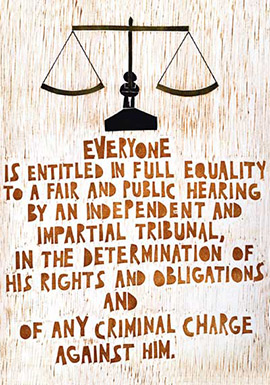 As a country that feels comfortable proudly proclaiming its “exceptional” status to the world and relishing in its perceived global leadership on human rights, the United States might find it somewhat uncomfortable being scrutinized this week on its own human rights record, when it is reviewed March 13-14 by the UN’s Human Rights Committee (HRC) for its compliance with the International Covenant on Civil and Political Rights (ICCPR), a legally binding treaty ratified by the United States in 1992.
As a country that feels comfortable proudly proclaiming its “exceptional” status to the world and relishing in its perceived global leadership on human rights, the United States might find it somewhat uncomfortable being scrutinized this week on its own human rights record, when it is reviewed March 13-14 by the UN’s Human Rights Committee (HRC) for its compliance with the International Covenant on Civil and Political Rights (ICCPR), a legally binding treaty ratified by the United States in 1992.
The review, which takes place every several years, is a rare spotlight on domestic human rights issues within the United States, as well as its prosecution of the “war on terror” abroad. It is one of the few occasions where the U.S. government is compelled to defend its record on a range of human rights concerns, speaking the language of international law rather than the usual language of constitutional rights.
One of the primary issues the United States will be asked to clarify this week is the applicability of the ICCPR to its military engagements overseas, including indefinite detention and the extrajudicial killings carried out by unmanned aerial vehicles, or drones.
Ben Emmerson, UN Special Rapporteur on the promotion and protection of human rights and fundamental freedoms while countering terrorism, has just completed an investigation into 37 recent drone strikes, in which he noted a sharp rise in strikes and a “significant number” of civilian casualties since the end of 2013. Emmerson has demanded greater accountability and transparency on drone strikes, including public investigations into allegations of civilian casualties.
In its questionnaire to the U.S. government ahead of this year’s review, the top question of the HRC was for clarification of the government’s position on the applicability of the ICCPR in the war on terror.
Specifically, the HRC requested that the U.S. clarify “the State party’s understanding of the scope of applicability of the Covenant with respect to individuals under its jurisdiction but outside its territory; in times of peace, as well as in times of armed conflict.”
Following the last review of the United States, in July 2006, the U.S. government articulated “its firmly held legal view on the territorial scope of application of the Covenant,” namely that the ICCPR does not apply to U.S. actions with respect to individuals under its jurisdiction but outside its territory, nor in time of war.
The HRC objected to this “restrictive interpretation made by the State party of its obligations under the Covenant,” and urged the U.S. to “review its approach and interpret the Covenant in good faith, in accordance with the ordinary meaning to be given to its terms in their context, including subsequent practice, and in the light of its object and purpose.”
Specifically, in its response to the U.S. report, the HRC urged the United States to:
(a) acknowledge the applicability of the Covenant with respect to individuals under its jurisdiction but outside its territory, as well as its applicability in time of war;
(b) take positive steps, when necessary, to ensure the full implementation of all rights prescribed by the Covenant; and
(c) consider in good faith the interpretation of the Covenant provided by the Committee pursuant to its mandate.
It does not appear, however, that the U.S. will be changing its legal position regarding the treaty’s extraterritorial applicability. As the New York Times reported on March 6,
The United Nations panel in Geneva that monitors compliance with the rights treaty disagrees with the American interpretation, and human rights advocates have urged the United States to reverse its position when it sends a delegation to answer the panel’s questions next week. But the Obama administration is unlikely to do that, according to interviews, rejecting a strong push by two high-ranking State Department officials from President Obama’s first term.
Caitlin Hayden, a National Security Council spokeswoman, declined to discuss deliberations but defended the existing interpretation of the accord as applying only within American borders. Called the International Covenant on Civil and Political Rights, it bars such things as unfair trials, arbitrary killings and the imprisonment of people without judicial review.
However, in a 56-page internal memo, the State Department’s former top lawyer, Harold Koh, concluded in October 2010 that the “best reading” of the accord is that it does “impose certain obligations on a State Party’s extraterritorial conduct.”
Despite Koh’s opinions, the Obama administration has reportedly decided not to reverse the previous U.S. position due to fears that accepting that everything from extraterritorial drone strikes to NSA surveillance could fall within the purview of the ICCPR.
The ACLU’s Jamil Dakwar pointed out in a blog post on Sunday that “the review will cast light on a dark underbelly of American exceptionalism — our refusal to acknowledge that human rights treaties have effect overseas.” The only other country in the world that claims that human rights treaties don’t apply to extraterritorial action is Israel, Dakwar noted.
Perhaps anticipating a difficult review, the United States is sending a huge delegation of government lawyers and military officials to defend the U.S. position. The HRC apparently had to reserve a bigger hall to accommodate the sizable U.S. government delegation and more than 70 human rights advocates and observers who will be in attendance at the six-hour session.
In addition to issues related to the global war on terror, the HRC will review U.S. compliance with its ICCPR obligations on matters such as the rights of indigenous peoples, the death penalty, solitary confinement, voting rights, migrant and women’s rights, and NSA surveillance.
The ACLU submitted a shadow report to the committee highlighting examples of accountability gaps between U.S. human rights obligations and current law, policy, and practice. “U.S. laws and policies remain out of step with international human rights law in many areas,” notes the ACLU.
In addition, the ACLU provided an update to the issues covered in its September submission to the committee, which addresses serious rights violations that have emerged in recent months. The report covers:
- Anti-Immigrant Measures at the State and Federal Levels
- U.S.-Mexico Border killings and Militarization of the Border
- Solitary Confinement
- The Death Penalty
- Accountability for Torture and Abuse During the Bush Administration
- Targeted Killings
- NSA Surveillance Programs
The U.S. Human Rights Network has also submitted 30 shadow reports and currently has a delegation in Geneva, conducting activities over the course of the week to ensure that UN and U.S. officials understand the human rights realities of communities across the country.
USHRN’s shadow reports cover a wide range of issues including indigenous rights, equal protection of men and women, prisoners’ rights, freedom of association, political participation, and access to justice. The Center for Constitutional Rights has submitted shadow reports on issues including police departments’ stop-and-frisk policies, deportations of immigrants, and arbitrary detention at Guantanamo Bay.
As the ACLU’s Jamil Dakwar wrote on Sunday,
More than ever, the U.S. is facing an uphill battle to prove its bona fides on human rights issues. The United States is not only seen as a hypocrite, resisting demands to practice at home what it preaches abroad, it is now increasingly seen as a violator of human rights that is setting a dangerous precedent for other governments to justify and legitimize their own rights’ violations.
Despite this fact, the U.S. continues to ruffle feathers around the world with its increasingly hypocritical criticisms of other countries. On February 27, the State Department released its annual human rights report on the global human rights situation. As Secretary of State John Kerry said in releasing the report:
Even as we come together today to issue a report on other nations, we hold ourselves to a high standard, and we expect accountability here at home too. And we know that we’re not perfect. We don’t speak with any arrogance whatsoever, but with a concern for the human condition.
Our own journey has not been without great difficulty, and at times, contradiction. But even as we remain humble about the challenges of our own history, we are proud that no country has more opportunity to advance the cause of democracy and no country is as committed to the cause of human rights as we are.
Kerry’s comments not only likely infuriated the frequent targets of U.S. criticism, but also were offensive to every other country on earth that takes the cause of human rights seriously. By saying that “no country is as committed to the cause of human rights as” the U.S., what he’s really saying is that even countries such as Iceland or Denmark which have made human rights core pillars of their foreign policy don’t come close to the U.S. standard.
Not unexpectedly, China and Russia immediately denounced the U.S. human rights report, saying the United States is hardly a bastion of human rights standards and is on poor footing to judge other nations.
“The United States always wants to gossip and remark about other countries’ situations, but ignores its own issues. This is a classic double standard,” said Chinese Foreign Ministry spokesman Qin Gang.
The combination of the U.S. drone assassination programs, a National Security Agency under increasing global scrutiny for its dragnet surveillance practices, rampant gun violence, poor labor standards, and use of solitary confinement in jails shows that the U.S. is hardly without its own human rights abuses, noted China in its own report, “The Human Rights Record of the United States in 2013.”
Moscow concurred, with Russian Foreign Ministry’s commissioner for human rights, democracy and supremacy of law Konstantin Dolgov saying on March 4 that the U.S. human rights report “has the same flaws that were typical for previous similar reports.”
“The document is cramped with selective and stereotype assessments with the use of double standards, for instance, regarding tragic events in Ukraine,” Dolgov noted.
He pointed out that the U.S. has “acute problems with equal suffrage rights in the US and their equal access to justice.” Further, the U.S. leads the world with the number of incarcerated citizens, with with 2.2 million prisoners, Dolgov said.
As the U.S. is forced to answer for its own human rights record this week, it will be interesting to see how forthcoming it is on these problems, or if it will continue to tout its claimed status as the human rights champion of the world.
The entire U.S. ICCPR review, taking place March 13 and 14, will be broadcast live on UN TV. To follow on Twitter, use the hashtag #ICCPRforAll.
For Compliance Campaign’s archive of ICCPR related articles, see here.
Did Manning’s court-martial meet international fair trial standards?
“Everyone is entitled in full equality to a fair and public hearing by an independent and impartial tribunal, in the determination of his rights and obligations and of any criminal charge against him.”
— Universal Declaration of Human Rights
With a sentence expected to be handed down in Bradley Manning’s court-martial this week, the presiding judge, Col. Denise Lind, is coming under criticism for possible lack of judicial independence, calling into question the fairness of the trial and any sentence that he receives.
Trevor Timm, executive director of the Freedom of the Press Foundation, said that throughout the trial, it has been “disappointing to see that almost every ruling, whether they’re major or minor, seems to go against the defense.” Others have noted that despite spending three years in pretrial confinement, Lind ruled that the delays had been “reasonable.”
Before the trial even began, President Barack Obama declared Manning’s guilt by flatly stating, “He broke the law.” The president’s declaration was widely picked up by the media, likely having significant influence over the public perception of Manning’s case, as well as potentially sending a message to the judge, a direct subordinate of Obama as Commander-in-Chief of the U.S. Armed Forces.
As Glenn Greenwald noted at the time, “The impropriety of Obama’s public pre-trial declaration of Manning’s guilt (‘He broke the law’) is both gross and manifest. How can Manning possibly expect to receive a fair hearing from military officers when their Commander-in-Chief has already decreed his guilt?”
He called it “reckless in the extreme for him to go around decreeing people guilty who have not been tried: especially members of the military who are under his command and who will be adjudged by other members of the military under his command.”
Steven Aftergood, a classified information expert at the Federation of American Scientists, told Politico.com, “The comment was not appropriate because it assumes that Manning is guilty. The president got carried away and misspoke. No one should mistake a charge for a conviction — especially the nation’s highest official.”
Beyond simply inappropriate, the president’s comment may have breached the United States’ commitments to international fair trial standards. According to Article 14(2) of the International Covenant on Civil and Political Rights, “Everyone charged with a criminal offense shall have the right to be presumed innocent until proved guilty according to law.”
As the Lawyers Committee on Human Rights explains this provision of the ICCPR, “The presumption of innocence must … be maintained not only during a criminal trial vis á vis the defendant, but also in relation to a suspect or accused throughout the pre-trial phase. It is the duty of both the officials involved in a case as well as all public authorities to maintain the presumption of innocence by ‘refrain[ing] from prejudging the outcome of a trial.’”
Obama’s declaration may have had an undue command influence over the proceedings, a possibility that has been compounded by the fact that Judge Lind was given a promotion while the trial was underway. As the Washington Post reported last month, “Lind has already been informed that she will take up a new position, as a judge on the U.S. Army Court of Criminal Appeals, when the Manning trial ends.”
Attorney Michael Ratner said that he found the promotion “pretty extraordinary” considering the context of the case and the possible conflicts of interest involved.
“I don’t know whether it’s—I don’t think it’s necessarily illegal,” he said, “but it does—it’s interesting to me that she’s going upstairs during the very trial that’s going on, and given that promotion.”
Lind’s promotion raises the possibility of whether there may have been a quid pro quo. Is it possible that she was promised the appellate court job contingent upon her decisions in the Manning case? This, of course, speaks to the question of judicial impartiality and independence, key components of international fair trial standards. As the Lawyers Committee explains,
Independence presupposes a separation of powers in which the judiciary is institutionally protected from undue influence by, or interference from, the executive branch and, to a lesser degree, from the legislative branch. …
While independence primarily rests on mechanisms aimed at ensuring a court’s position externally, impartiality refers to its conduct of, and bearing on, the final outcome of a specific case. Bias (or a lack thereof) is the overriding criterion for ascertaining a court’s impartiality. It can, thus, be prima facie called into question when a judge has taken part in the proceedings in some prior capacity, or when s/he is related to the parties, or when s/he has a personal stake in the proceedings. It is also open to suspicion when the judge has an evidently preformed opinion that could weigh in on the decision-making or when there are other reasons giving rise to concern about his/her impartiality.
Another key component of international fair trial standards is the right to a speedy trial as outlined in Article 9 (3) of the ICCPR, which states:
Anyone arrested or detained on a criminal charge shall be brought promptly before a judge or other officer authorized by law to exercise judicial power and shall be entitled to trial within a reasonable time or to release. It shall not be the general rule that persons awaiting trial shall be detained in custody, but release may be subject to guarantees to appear for trial, at any other stage of the judicial proceedings, and, should occasion arise, for execution of the judgement.
Despite this requirement, Manning spent his entire pre-trial period of three years in jail. This, despite the fact that the Human Rights Committee of the United Nations has held that confinement of more than six months is incompatible with the ICCPR.
Manning’s mistreatment during that unlawful pre-trial detention was also a cause for concern, with his prolonged solitary confinement regime “constitut[ing] at a minimum cruel, inhuman and degrading treatment in violation of article 16 of the convention against torture,” according to Juan Mendez, the UN Special Rapporteur on Torture.
The treatment, which included prolonged solitary confinement, forced nudity and denial of meaningful exercise or work opportunities, also constituted a breach of the ICCPR, which states that “All persons deprived of their liberty shall be treated with humanity and with respect for the inherent dignity of the human person.”
Another issue that arose during Manning’s court-martial, raising questions of whether it abided by international standards, was the lack of transparency that surrounded many aspects of the case.
Article 14 of the ICCPR provides for the right to a fair and public hearing, but Manning’s court martial was surrounded by secrecy and security, with Judge Lind and the military declining to even release official transcripts of the proceedings.
Many other documents were withheld or heavily redacted and significant portions of the sentencing testimony against Manning were closed to the public. Because of this, it remains unknown what damage the government claims that he caused by sending classified material to WikiLeaks.
His supporters maintain that Manning was acting in the public interest, but the court secrecy means that there is little public evidence about whether his leaks on balance helped or hurt the world.
“The public’s ability to understand the sentence is going to be permanently impaired by that fact that, unfortunately, there are large pieces of this that are going to be off the public record,” said Eugene Fidell, a visiting professor in military law at Yale Law School. “There are going to be missing pieces of the jigsaw puzzle.”
With a potential 90-year prison sentence being handed down by Judge Lind this week and the possibility of a long-term campaign for his freedom, it’s worth remembering that Manning’s rights have been violated every step of the way and that the U.S. has systematically abrogated fundamental components of international fair trial standards.
 Super Tuesday is afoot, with 661 delegates at stake in the Republican primary and 865 delegates for the Democrats. This means that a presidential candidate who does well could shift the momentum and change the media narrative in a way that fundamentally alters the course of Election 2016. Or not.
Super Tuesday is afoot, with 661 delegates at stake in the Republican primary and 865 delegates for the Democrats. This means that a presidential candidate who does well could shift the momentum and change the media narrative in a way that fundamentally alters the course of Election 2016. Or not.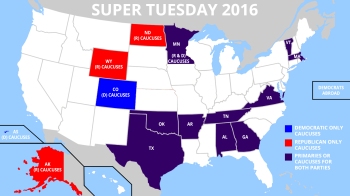 The big day, which could make or break several candidates on the Democratic and Republican sides (those who haven’t already dropped out after disappointing showings in earlier primary states), underscores the largely arbitrary and chaotic nature of United States primary elections, which are something of an oddity in advanced democracies.
The big day, which could make or break several candidates on the Democratic and Republican sides (those who haven’t already dropped out after disappointing showings in earlier primary states), underscores the largely arbitrary and chaotic nature of United States primary elections, which are something of an oddity in advanced democracies.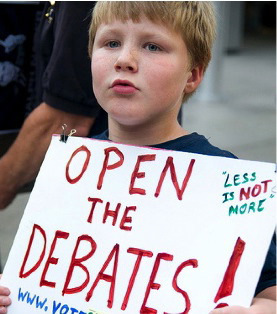 In the United States, which uses a strict and archaic winner-take-all system and erects severe obstacles to independent parties (including such challenges as stringent ballot access rules that
In the United States, which uses a strict and archaic winner-take-all system and erects severe obstacles to independent parties (including such challenges as stringent ballot access rules that 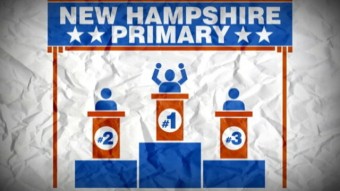 Because so much disproportionate weight is given to the states holding early primaries, including New Hampshire and Iowa, and because states holding primaries later – such as California – often don’t even get to vote for the same candidates (many of whom will have already dropped out by that time), the system is fundamentally flawed and effectively disenfranchises millions of would-be primary voters. (For example, New York, the third-largest state, voted after the nominees had been selected in both parties in 2000 and 2004.)
Because so much disproportionate weight is given to the states holding early primaries, including New Hampshire and Iowa, and because states holding primaries later – such as California – often don’t even get to vote for the same candidates (many of whom will have already dropped out by that time), the system is fundamentally flawed and effectively disenfranchises millions of would-be primary voters. (For example, New York, the third-largest state, voted after the nominees had been selected in both parties in 2000 and 2004.)
